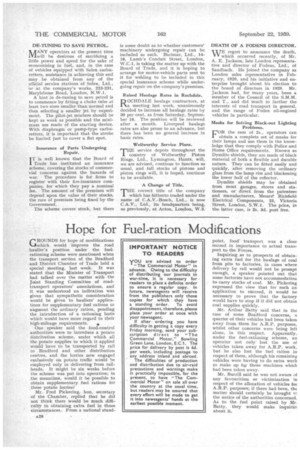Hope for Fuel-ration Modifications
Page 30

If you've noticed an error in this article please click here to report it so we can fix it.
GROUNDS for hope of modifications which would improve the road haulier's position under the fuelrationing scheme were mentioned when the transport section of the Bradford and District Chamber of Trade held a special meeting, last week. It was stated that the Minister of Transport had talked over the matter with the Joint Standing Committee of roadtransport operators' associations, and it was understood an indication was given that sympathetic consideration would be given to hauliers' applications for supplementary fuel rations to augment the ordinary ration, pending the introduction of a rationing basis which would have more regard to their
high-mileage requirements. , One speaker said the food-control authorities were to introduce a potato distribution scheme, under which all the potato supplies to which it applied would have to be transported by rail to Bradford and other distribution centres, and the lorries now engaged exclusively on potato traffic would be employed only in delivering from railheads. It might be six weeks before the scheme was put into operation; in the meantime, would it be possible to obtain supplementary fuel rations for • these potato lorries?
Mr. Fred Pickering, hon. secretary of the Chamber, replied that he did not think there would be much difficulty in obtaining extra fuel in those circumstances, From a national stand point, foodtransport was a close second in importance to actual transport to the Forces.
Inquiring as to prospects of obtaining extra fuel for the haulage of coal from pits to factories, in cases where delivery by rail would not be prompt enough, a speaker pointed out that some factories have not accommodation to carry stocks of coal. Mr. Pickering expressed the view that for such an application to succeed, it would be necessary to prove that the factory would have to stop if it did not obtain coal supplies quickly.
Mr. Arthur Batty said that in the case of some Bradford concerns, a quarter of their vehicles had been taken away from them for A.R.P. purposes, whilst other concerns were being left alone, in this respect. Apparently, under the fuel-rationing scheme, an operator not only lost the use of vehicles taken away for A.R.P. work, but he also lost the fuel ration in respect of them, although his remaining vehicles were having to do extra work to make up feir those machines which had been taken away.
Mr. 13urrill said he was not aware of any favouritism or victimization in respect of the allocation of vehicles for A.R.P. purposes; if there had been, the matter should certainly be brought c the notice of the authorities concerned. As to the fuel point raised by Mr. Batty, they would make inquirieE about it.




































































